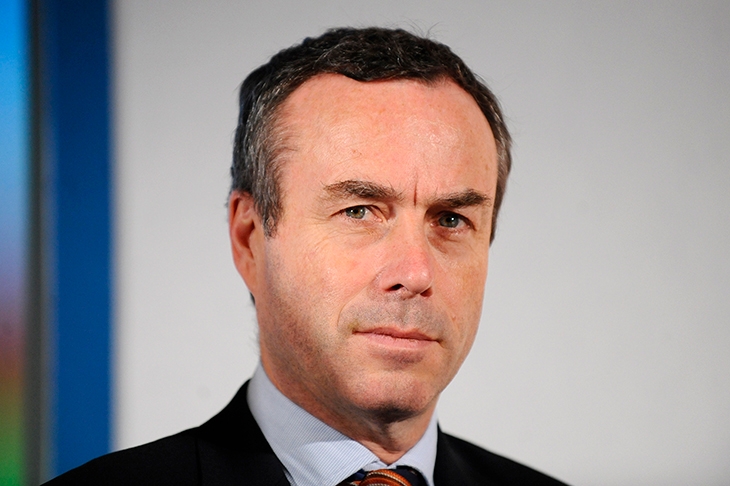As Lionel Barber recounts unrolling his pitch to replace me as editor of the Financial Times to the newspaper’s proprietor Marjorie Scardino, he retrospectively makes fun of his presentation: ‘You have to change the editor,’ he recalls telling the Pearson CEO in the summer of 2005. ‘Otherwise this sucker’s going down.’ Then an aside for readers: ‘Maybe she thought I had been watching too many Hollywood movies.’
Well, yes. There are some cinematic touches to Barber’s memoir of his long reign as FT editor from October 2005 to January 2020. This is true of his own self-portrait (gun-slinging journalistic enforcer in the Evans and Bradlee tradition, friend to the powerful, nemesis to the damned). It spills into his portrayal of the important people (many of them friends) he met while occupying the editor’s chair — the US treasury secretary who is ‘one tough hombre’, the financial masters of the universe with ‘matinee idol’ good looks, assorted despots and bureaucrats. That is a shame, because Barber has a good story to tell, and one that would have been better told without the swagger. In fact he has several good stories.
The first is one of journalistic success. He had a good run as FT head honcho — certainly much better than my briefer one that went before. He strengthened the pink ’un’s journalism and authority after wobbly times following the end of the dot-com boom. He advanced its international reputation — notably in the US — while maintaining its slightly challenged niche in the UK. Over time he charted a winning course for the FT as a digital news organisation with more than one million paying subscribers online and in print. The scoops (exposing massive fraud at Germany’s Wirecard to name the best) and must-read interviews (Putin’s attack on the idea of liberal democracy) with which he marked his last year or two werea fitting coda.
Barber frequently trotted the globe, torturing his foreign correspondents into organising ‘proconsular’ visits
As important for the FT’s long-term future, he took the lead in embracing new owners after it was sold to Japan’s Nikkei. Though Barber is too diplomatic to say so, Pearson under Scardino, for all her luvvy tendencies, was a wretched owner and had no idea what it wanted to do with the FT. Nikkei, with its focus on business journalism, deep pockets and appetite for digital change, was a much better bet.
The second strand is a story of our times: the climax of the Noughties boom, followed by the financial bust of 2008-9, the years of austerity, the growth of Big Tech, the rise of populism, Brexit and Trump.
As a self-styled ‘reporter-editor’, Barber trotted the globe like no editor before him — torturing legions of FT foreign correspondents into organising what he revealingly describes as ‘proconsular’ visits. On occasion one wonders whether the junketing was fully justified — a trip to the Middle East, for example, in autumn 2008 while the financial world was collapsing. But the travels do yield memorable vignettes. Probably the best illustrate the pre-crash insouciance and complacency among Wall Street’s finest, punctuated by an epic (off-the-record) warning of the scale of trouble looming from the new Fed chairman Ben Bernanke.
In the UK, Barber has sharp words for the decline of leadership, summarised in the words of an anonymous advisor to Barack Obama after a presidential visit to London: ‘Blair — substance and sizzle, Brown — substance, Cameron — sizzle.’ He gleefully records Brown’s periodic tantrums (which I also experienced) over FT reporting, manifestly had no time for Dave and is loftily dismissive of what came after.
Nor does he apologise for the pro-European bent that earned him the Légion d’honneur from France and vitriol from the Daily Mail (‘a weapons-grade social climber and name-dropper extraordinaire’). Opposing Brexit was the FT’s inevitable position, though he mildly chastises himself for underestimating the Leave campaign. In the aftershock of the Brexit vote he moved swiftly to focus on the mechanics and practicalities of leaving the EU — the sort of boring but important stuff for which many business folk need the FT.
The Powerful and the Damned does not have the light touch of Max Hastings’s entertaining account of his tenure at the Daily Telegraph, but it does contain a smattering of funny stories — such as Putin’s impromptu post-dinner performance of ‘Chopsticks’ on his UK ambassador’s piano; Donald Trump’s charming welcome to an FT delegation (‘I won, you lost’); and Chinese flunkies fretting about their PM’s apparent reference to a pig in interview comments about the US.
For those who care about serious matters such as press freedom and the viability of old media in the age of the smartphone, the book contains food for thought. Barber is surely right to read last rites over the Leveson inquiry, in light of much larger subsequent controversies about Big Tech, government snooping and data privacy. And thanks to those million paying subscribers, the FT’s future is as secure as that of any organisation that once focused purely on newspaper publishing.
Now all Barber has to worry about is life without constant privileged access to the powerful. For, as he recalls Ben Bradlee telling him when he started, it’s only when you cease to be editor that you discover who your real friends are.






Comments